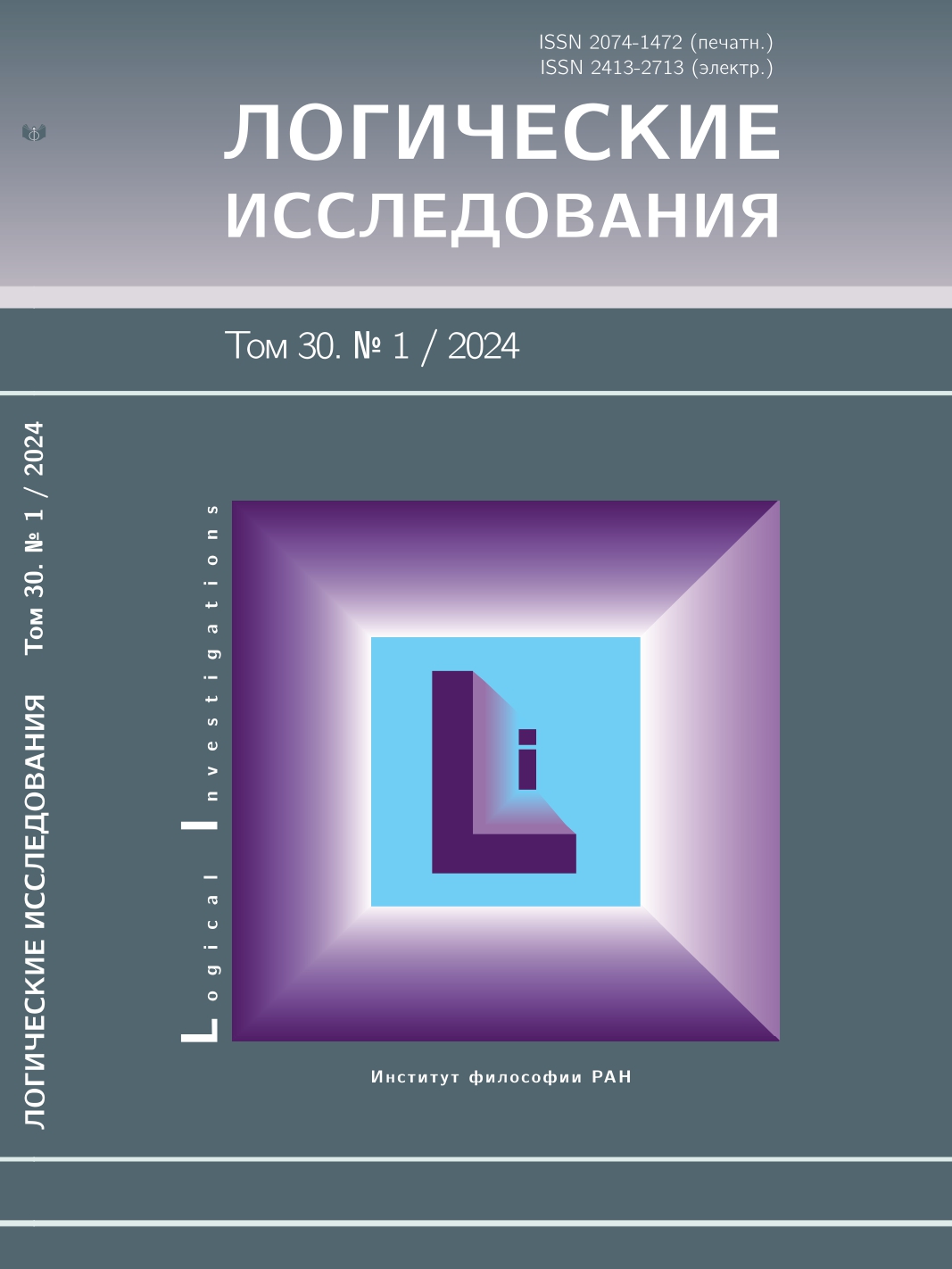Altenatives to Kripke semantics for epistemic logic
##plugins.themes.bootstrap3.article.main##
Abstract
The article discusses the difficulties that are caused by the use of standard Kripke semantics for the analysis of epistemic scenarios: the presence in the model of possible worlds that are indistinguishable by any formula; combinatorial explosion (exponential growth of the set of possible worlds); overspecification of the initial epistemic scenario by the proposed model. Alternative options for constructing epistemic logic that seek to overcome these difficulties are considered: semantics of knowledge structures and syntactic epistemic logic; an approach to constructing diagrammatic epistemic logic is also proposed.
##plugins.generic.usageStats.downloads##
##plugins.themes.bootstrap3.article.details##
Copyright (c) 2024 Виталий Долгоруков

This work is licensed under a Creative Commons Attribution-NonCommercial 4.0 International License.
##plugins.generic.funding.fundingData##
-
Russian Science Foundation
##plugins.generic.funding.funderGrants## 23-18-00695
References
Боброва, 2017 – Боброва А.С. Логическая теория, построенная геометрическим образом // Логико-философские штудии. 2017. Т. 15. № 1. С. 28–43.
Бежанишвили, 2022 – Бежанишвили М.Н. Логика модальностей знания и мнения. М.: УРСС, 2022. 288 с.
Виньков, Фоминых, 2011 – Виньков М.М., Фоминых И.Б. Рассуждения о знаниях и проблема логического всеведения. Часть I. Модальный подход // Искусственный интеллект и принятие решений. 2011. № 4. С. 3–13.
Долгоруков, 2022 – Долгоруков В.В. О трудностях определения имплицитного знания группы // Логические исследования. 2022. Т. 28. № 1. С. 9–26.
Зайцев, 2015 – Зайцев Д.В. Моделирование диалога с публичными объявлениями // Логические исследования. 2015. Т. 21. № 1. C. 155–166.
Нечитайлов, 2006 – Нечитайлов Ю.В. К разнообразию представления ментальных свойств агентов в эпистемической логике // Логико-философские штудии. 2006. № 4. C. 23–30.
Новиков, Чхартишвили, 2022 – Новиков Д.А., Чхартишвили А.Г. Рефлексия и управление: математические модели. М.: URSS, 2022. 416 с.
Павлова, 2022 – Павлова А.М. Знание и его динамика в интуиционистской логике // Философский журнал. 2022. Т. 15. № 3. С. 113–124.
Пиетаринен 2015 – Пиетаринен А.В. Экзистенциальные графы. К вопросу и диаграмматической логике познания // Логико-философские штудии. 2015. Т. 12. № 2. C. 39–64.
Artemov, 2014 – Artemov S. On Definitive Solutions of Strategic Games / Johan van Benthem on Logic and Information Dynamics. Cham: Springer, 2014. P. 487–507.
Artemov, 2016 – Artemov S. Knowing the Model. URL: https://doi.org/10.48550/arXiv.1610.04955 (дата обращения: 04.12.2023).
Artemov, 2019 – Artemov S., Fitting M. Justification Logic: Reasoning with Reasons. New York: Cambridge University Press, 2019. 268 p.
Artemov, 2022 – Artemov S. Towards Syntactic Epistemic Logic // Fundamenta Informaticae. 2022. Vol. 186. No. 1–4. P. 45–62.
Artemov, 2018 – Artemov S. Hyperderivations. The Hausdorff Trimester Program: Types, Sets and Constructions, Hausdorff Center for Mathematics, Bonn, 2018, URL: https://www.youtube.com/watch?v=kytYAi6Ln7U (дата обращения: 04.12.2023).
Artemov, Protopopescu, 2016 – Artemov A., Protopopescu T. Intuitionistic Epistemic Logic // The Review of Symbolic Logic. 2016. Vol. 9. No. 2. P. 266–298.
Aumann, 1999 – Aumann R. Interactive epistemology I: Knowledge // International Journal of Game Theory. 1999. Vol. 28. No. 3. P. 263–300.
Aumann, Brandenburger, 1995 – Aumann R., Brandenburger A. Epistemic Conditions for Nash Equilibrium // Econometrica. 1995. Vol. 63. No. 5. P. 1161–1180.
Baltag et al., 2019 – Baltag A., Bezhanishvili N., ¨Ozg¨un A., Smets S. A Topological Approach to Full Belief // Journal of Philosophical Logic. 2019. Vol. 48. Is. 2. P. 205–244.
Bjorndahl, Özgün, 2020 – Bjorndahl A., Özgün A. Logic and Topology for Knowledge, Knowability, and Belief // The Review of Symbolic Logic. 2020. Vol. 13. No. 4. P. 748–775.
Dubois, 2012 – Dubois D. Reasoning about ignorance and contradiction: Many-valued logics versus epistemic logic // Soft Computing. 2012. Vol. 16. No. 11. P. 1817-1831.
Fagin et al., 2003 – Fagin R., Halpern J., Vardi Y. Reasoning about Knowledge. Cambridge MA: MIT Press, 2003. 544 p.
Fedyanin, 2019 – Fedyanin D. Epistemic Planning in Network Muddy Children Puzzle // Одиннадцатые Смирновские чтения по логике: материалы Международной научной конференции, 19–21 июня 2019, г. Москва. М.: Современные тетради, 2019. P. 87–89.
Gattinger, 2018 – Gattinger M. New directions in model checking dynamic epistemic logic. 2018, URL: https://malv.in/phdthesis/gattinger-thesis.pdf (дата обращения: 04.12.2023).
Hammer, 2001 – Hammer E.M. Diagrammatic Logic // Handbook of Philosophical Logic / Eds. Gabbay, D.M., Guenthner, F. Vol. 4. Dordrecht: Springer, 2001. P. 395–422.
Hendrics, 2005 – Hendrics V. Mainstream and Formal Epistemology. Cambridge: Cambridge University Press, 2005. 202 p.
Hintikka, 1962 – Hintikka J. Knowledge and belief. An introduction to the logic of the two notions. Ithaca: Cornell University Press, 1962. 179 p.
Kubyshkina, Zaitsev, 2016 – Kubyshkina E., Zaitsev D.V. Rational Agency from a Truth-Functional Perspective // Logic and Logical Philosophy. 2016. Vol. 25. No. 4. P. 499–520.
Ma, Pietarinen, 2018 – Ma M., Pietarinen A.-V. Gamma Graph Calculi for Modal Logics // Synthese. 2018. Vol. 195. P. 3621–3650.
Meyer, van der Hoek, 1995 – Meyer J.-J., van der Hoek W. Epistemic Logic for Computer Science and Artificial Intelligence. Cambridge: Cambridge University Press, 1995. 372 p.
Petrukhin, 2021 – Petrukhin Y. The Logic of Internal Rational Agent // The Australasian Journal of Logic. 2021. Vol. 18. No. 2. P. 29–50.
Pietarinen, 2006 – Pietarinen A.-V. Peirce’s Contributions to Possible-Worlds Semantics // Studia Logica. 2006. Vol. 82. No. 3. P. 345–369.
Santos, 2020 – Santos Y.D. A Four-Valued Dynamic Epistemic Logic // Journal of Logic, Language and Information. 2020. Vol. 29. No. 4. P. 451–489.
